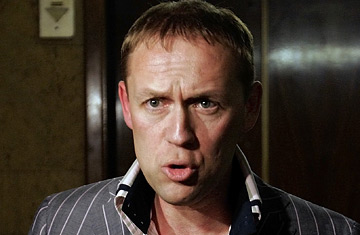
British officials said that they will seek the extradition of Andrei Lugovoi from Russia to face a charge of murder in the poisoning death of former Soviet agent Alexander Litvinenko.
By coincidence, the prosecutors made their announcement as Marina Litvinenko was visiting Fedotov, at his invitation, at the Russian embassy to discuss her husband's case and to discuss an open letter she had written to the Russian government. Louise Christian, a prominent British human rights lawyer, who accompanied Mrs. Litvinenko to the meeting, read her notes of the meeting to TIME. She says Fedotov stated that an unfortunate shadow has been cast on the reputation of the Russian government by the case. He said the government is interested in finding the truth and investigating the case properly, but that it was a matter for the Russian federal prosecutor to handle.
Unless the Kremlin now serves up a surprise extradition, there is little prospect of a trial in London to test the evidence that led British prosecutors to their move. Ninety percent of the world's polonium 210 comes from a single facility in Russia. Investigators found traces of polonium 210 not only in Britain but also in Hamburg, at locations visited by Lugovoi's associate Dmitri Kovtun, the day before Kovtun and Lugovoi attended a meeting with Litvinenko at London's Millennium Hotel. Kovtun has not been charged.
Both Lugovoi and Kovtun deny any involvement in the murder. In April, Lugovoi even suggested they might even apply for assistance from the Litvinenko Justice Foundation, established by Marina Litvinenko, family friend Alex Goldfarb and the exiled businessman Boris Berezovsky, who supplied $1 million in start-up funds. The foundation aims to keep up the pressure for Litvinenko's killers to be brought to justice and to help seek compensation for the 200-odd people who came into contact with the polonium 210 . "We have borne considerable financial loss due to medical testing, which I am still undergoing," said Lugovoi. "Since Mr. Berezovsky has decided to create this fund to help polonium victims, I think we are direct victims and should be on top of the list of those who can claim this help."
The Kremlin and British investigators have, so far, not agreed on much about the case, with Russian investigators suggesting that Litvinenko's murderer is likely to be found among London's fast-growing community of exiled Russian dissidents and expats. Russian human rights activist Oleg Panfilov says he does not expect the Kremlin to change its tune now. "They see the whole thing not as a crime to be resolved, but as a sharp point of their confrontation with the West."
Russia's relations with Europe have become increasingly fractious as it flexes its new clout owing to rising prices for its vast stores of natural resources. It now supplies around a quarter of Europe's natural gas and a rising proportion of its oil. Human rights, however, are in shorter supply. Earlier this month, German Chancellor Angela Merkel chided Putin for restrictions on opposition rallies during an E.U.-Russia summit. Putin's response: "What is pure democracy? It is a question of ... whether you want to see the glass half-full or half-empty." While Litvinenko's murder remains unsolved, many fear the levels in that glass will continue to fall.
